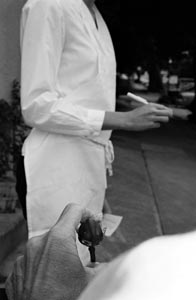 Mind Your Manners: It's not difficult to be a good customer, but for some reason the most charming customer can turn into the most childish.
Mind Your Manners: It's not difficult to be a good customer, but for some reason the most charming customer can turn into the most childish.
How to eat out
By Paul Adams
Your waiter is not your friend, or your entertainment. But he or she can make the difference between an excellent dining experience and a dreadful one, depending on how you behave.
Waiting tables is a job. The waiter is not there to be your buddy, your fan or your serf. Your mutual responsibility is to effectively get food that you want to your table, while attempting to annoy each other only minimally. The unspoken agreement, of course, is that the better you act as a customer, the higher the quality of the service you receive.
Of course, a fine-dining establishment is supposed to hire professional-acting waitstaff, which means that no matter how annoying you are, they will hesitate to take revenge. At least in theory. "Janet," who has waited tables at several fine San Francisco establishments, finds "delight in doing things like practically ignoring an obnoxious table" and confesses that she has even been tempted on occasion to secretly introduce "certain unappetizing substances" into patrons' dishes. But any such action, or even minor sass, on the part of the waiter is highly risky, because a complaint by a customer can easily be the end of a waiter's tenure.
It does not sound difficult to be a good customer, but for some reason, otherwise completely palatable people can prove extremely vexatious to their waiter. Because common sense doesn't seem to be sufficient as a guideline for how to behave, here are some tips on how to improve your dining-out experience by being a good customer.
One of the most effective ways to make your server hate you is to establish an antagonistic or competitive relationship with them, by acting like you know more about food than they do, or know all about the restaurant. Nothing can be gained by such behavior. Don't say, "Oh, tell Bradley this was wonderful" or otherwise refer to the chef by first name unless you and he are friends.
With few exceptions, the restaurant's best dishes are on the menu. It is unlikely that there is some "better" preparation whose existence is being concealed from you until such time as you can (a) prove that you deserve it or (b) trick the server into admitting that there is such a more-delicious dish, through incisive questioning about "other specials" and the like.
"Dr. P.," a waitress at a famous Bay Area restaurant who prefers to remain anonymous, tells of a mother and daughter who "kept asking about what was 'off-menu,' as in, 'We only order off-menu, you see.' The urge to respond, 'You speakee Engleesh?' was powerful." Some customers (such as, we are told, Bonnie Raitt) refuse to look at the menu altogether.
Also, in general, refrain from teasing waitstaff. How would you like it if somebody came to your workplace and subtly interfered with and made fun of you as you worked? What you think is a funny remark is no doubt exquisitely irritating to someone who hears its like 50 times a night. Even if your intentions are good, your server is probably busy (unflappable though she may appear) and cannot linger to chat and joke and flirt. It is fine to ask questions about menu items, comment on the food and even banter a bit if the server seems so inclined, but remember to empathize: Waiting tables is hard work. Is your waiter being friendly because he likes you or because he is paid to be friendly? If it's the latter, ease off.
Outright bad customership aside, though, it is unlikely that a good customer will receive better service than an average one, except for perhaps a genuine smile in lieu of a professional one. According to "Dr. P.," "most good waiters have such a strong sense of how they want things to go that we'll be on top of things for both kinds of customers, with no real difference in service."
So just try to use common sense. And tip 20 percent after tax. Maybe you'll be a waiter in your next life.
[ San Francisco | MetroActive Central | Archives ]
![[MetroActive Dining]](/dining/gifs/dining468.gif)